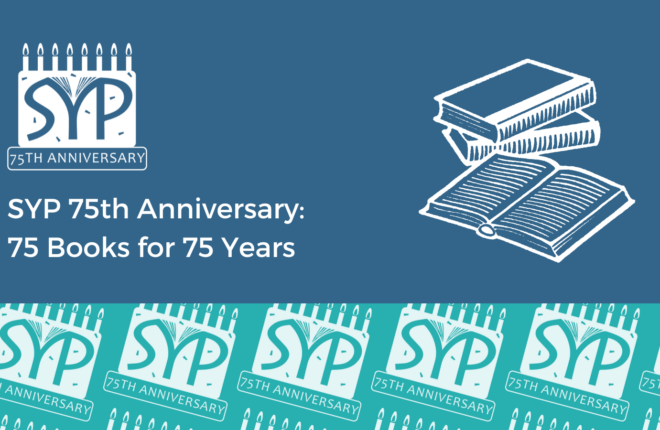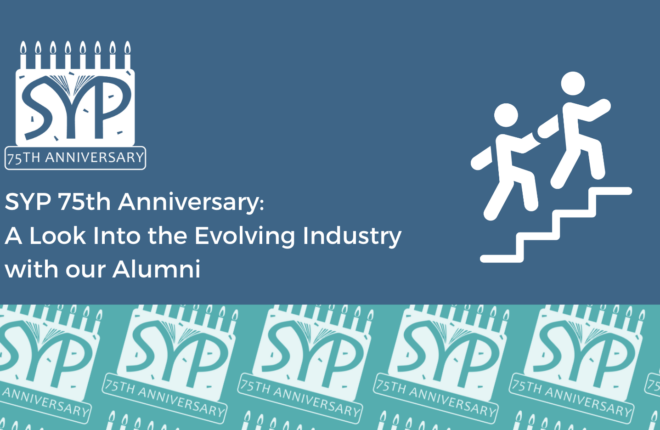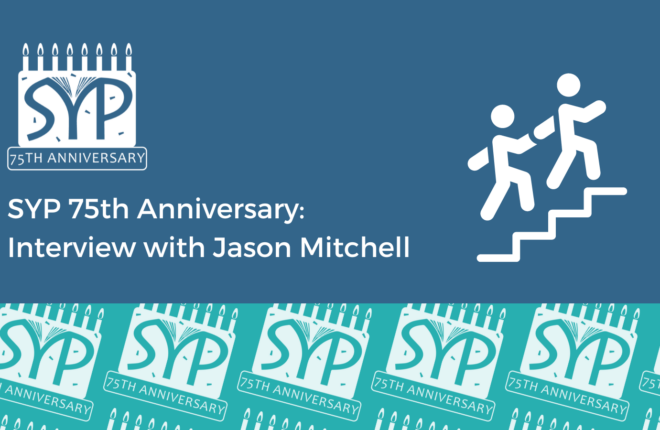
SYP 75th Anniversary: Interview with SYP Alumni: Zara Markland
Posted on November 11, 2024 in 75th Anniversary

As part of our 75th anniversary celebrations, we are interviewing alumni to learn more about the SYP and the values that underpin our society.
We are interviewing Zara Markland, who coordinated the division of the London committee into two London and UK committees and shaped the SYP organisation into the structure we recognise today.
Why did you make the decision to split out London/ UK into two different committees, and what did you hope that would mean for the future of SYP?
This is a good one. When I took over as SYP Chair these were one and the same and the responsibilities all meshed together, which should show you how much work my predecessors and then me were doing as part of that role. I noticed that I had oversight of not only London based events and goings on but also InPrint, the entire SYP membership and funds and also representing the SYP as a whole in the wider industry. A lot of that did involve mainly London central representation due to the locations of the larger publishing houses but I was aware we had other branches and my origins in Manchester-based publishing meant I knew publishing was far from isolated to the London bubble. I started immediately by liaising with the other chairs, at that time Oxford, North and Midlands, Scotland and Ireland/Eire to see how all the existing branches fit into the picture. The reality was that the SYP was thriving but not as a single unit, instead as a loosely linked group of separate entities.
There were a few reasons why at that point I thought long and hard about splitting the UK responsibilities away from the London activities. Firstly, in the short term, due to the way responsibilities had fallen the distribution of membership funds did not take into account location of members or other branches, so while we had a strong bank balance we needed to get that more evenly distributed out across all the branches. Secondly, as I looked to the future of the SYP as a whole my thoughts centred around how together we would be stronger, provide a better experience for members by being able to tap into the whole community regardless of where they are (and even go to other branches when in those areas!) and as a result we could grow to be a major force and presence in nationwide publishing – we had some presence at the time but we had a lot of scope to be known a lot more than we were! Thirdly, several roles were doubling up doing London and UK wide management without knowing it – mainly my role as Chair, vice chair, membership and treasurer. As voluntary roles this was impossible to do well without affecting other team members and without negatively impacting on members. Something had to change.
By having a central, neutral UK committee not linked to a particular regional branch but instead focused on the SYP brand in the industry, focused on those relationships between our branches, focusing on our membership as a whole, we would start seeing ourselves as one force and one membership, and the publishing houses would start seeing us this way as well. All branches would be equally balanced in the wider network and hopefully feel they had equal presence, voice and input, a concept I believe had gotten clouded by having responsibilities mingled with the London region for so long. London would also benefit from a dedicated chair and treasurer focused solely on the London publishing scene – and of course cutting down committee meeting time!
Do you think this is something that has materialised?
I would have to say yes, from the newsletters I receive I can see just how much SYP has grown in the industry but also together; the insights into all the branches and the outreach even outside of them is phenomenal. I have to shout out my successors here – Alice Geary and Ain Deheb Bensenouci, who did such a fabulous job picking up this new state of being and building it into the strong reality we have today. For me, the strength of the SYP is how with each new year, a new set of enthusiastic and brilliant committees can build on what our predecessors have done, adding our own magic and ensuring the SYP thrives, staying prominent and relevant across the industry.
This is a hard question but what is your favourite SYP experience/memory?
oooo that is a hard one. Let’s see. I would have to say the day of the SYP conference back during my tenure. The team had worked so hard to put it together, special mention to Katrin Krusch who and Zoe Portway who put so much work into that. It was a culmination of the whole team pulling together and a wonderful example of the power and achievement we can reach together. The whole team together celebrating our success with key figures across the industry was a true highlight of my time with the SYP. I remember being so proud to work with such amazing peers and to see what we had created together.
SYP is all about networking and sharing knowledge amongst peers, and has been that way since it started back in 1949. What did you learn from your SYP peers during your time on the committee and chairing SYP?
What an interesting question. Well, one very prominent thing that I saw everyday during my time in the SYP was how much people across the publishing industry care about what they do and what impact they can have on the world. Nothing can be truer than those who decide to get involved with the SYP in whatever form they are involved. I saw so many examples of individuals going above and beyond in their spare time to make whatever they were working on a success – I learnt about resilience, determination and true dedication to the cause. It was humbling. As far as learning skills or about the industry I really loved learning about the different publishing houses and roles everyone was involved in – the SYP cohort are truly a varied lot and being involved gives you the opportunity to see publishing through many different lenses.
The Poetry anthology project sounds really interesting! Can you tell us a bit more about how that came about and what it resulted in?
The poetry anthology was a spontaneous honour to be a part of. If I remember correctly it all began with another SYP Chair, Lottie Chase, who had been working before my time on a poetry collection made up of poems from budding new poetry talent, Matthew Gilbert, alongside other writers. I was brought into the picture in early spring 2016 during my SYP chair tenure, to continue an ongoing discussion with Sharon and Tim, Matt’s parents, about the SYP supporting the posthumous publishing of a second anthology after Matt sadly lost his battle with testicular cancer. This anthology would be entirely made up of Matt’s work including known pieces and some pieces newly discovered among Matt’s possessions. To have an anthology published in his name was part of Matt’s last wishes, a wish that Sharon and Tim were determined to make come true, cementing Matt’s legacy and keeping his memory firmly alive.
The building of the anthology and the buzz around it was a joint effort between us at the SYP (publisher), Peter Davey and Wonderzoo (illustrations coordination & PR/events coordination) and Teenage Cancer Trust (foreword and charitable support). We worked together over the next year and a half to print, publish and market the anthology, made up of Matt’s poems, related illustrations and words written about Matt, resulting in a well publicised launch in January 2019. This wouldn’t have been possible on the SYP side without the ongoing support and contributions of Lottie Chase, Alice Geary (SYP UK Chair 2017), and designer Andrea Eliasdottir.
The results of all our hard work culminated in a limited 150 copy print run of the beautiful anthology “Unfinished Works”, made up entirely of Matt’s poetry pieces and complete with UK ISBN. All contributors received a copy and many of the copies were all sold within days of release, with 100% of profits going to Teenage Cancer Trust. Our decision to include an ISBN meant Matt’s work would be a lasting record in the British Library as well as other major libraries across the UK. Matt’s legacy and memory would be forever preserved.
What is one bit of advice you have for those currently within the industry?
Publishing is an industry that thrives on the people within it and has the capacity to reach many more through the words we publish out into the world. Stay true to yourself and what you are contributing knowing that every book has the capacity to change irrevocably numerous lives and realities.



 Listen to the podcast
Listen to the podcast  Explore the Youtube channel
Explore the Youtube channel